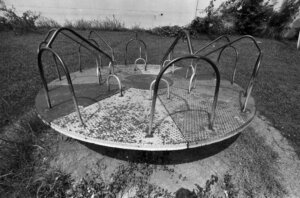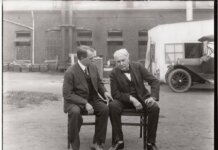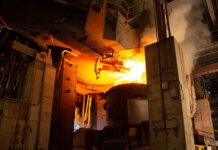
Absent context, the front-page photograph of the June 10, 1980, issue of the Huntsville Times depicts a rather dystopian scene. Three young boys look upon a structure engulfed in flames. “HUNTSVILLE LANDMARK IS BURNED” reads the clarifying headline. That landmark was the Whitesburg Theatre, Huntsville’s first drive-in. When it was new, the Whitesburg was an out-of-the-way distraction amidst the pressures of the modern age, located beyond Huntsville’s city limits. By the time it closed in 1979 after three decades, the Rocket City had grown up around — and outgrown — the theater.
Although it’s hard to think of that area today as being remote, the Whitesburg opened on June 16, 1949, amidst forests and fields, at what was then the end of Airport Road. The first film was the Universal Pictures comedy “The Senator Was Indiscreet,” starring William Powell as a dim-witted U.S. senator with presidential ambitions, a gossipy diary and fumbling feet of clay. Tickets were 40¢ for adults and 10¢ for children over five.
Walton and Martha Fleming, along with Charles A. Crute, ran the $100,000 theater under the aegis of Acme Investments Inc., one of many. Contractors poured some 28,000 square tons on concrete at the site. The theater was laid out on a 70-degree angle, ensuring each car had an unobstructed view of the screen. The 400 parking spots were equipped with post-mounted speakers with individual volume controls. There was even a free bottle-warming service for the smallest moviegoer, so parents could enjoy a night out while avoiding the “no babysitter problem.” Playground equipment beneath the glow of the screen came soon thereafter for older fidgety youngsters to expend energy. After a few years, the company enlarged the screen to 60 feet high and 100 feet wide.

For much of the theater’s history, Robert Ross managed the snack bar, located in the center of the complex. He sourced produce and other ingredients from area farmers. “People said we had the best cheeseburgers in town,” he later recalled with pride. Drive-ins typically attracted the younger set as employees, which could present its own challenges. This was perhaps the reason behind a classified ad Ross placed in 1962 calling for a “Mature Lady” to work concessions.
Memories of the places where we view the films of our youth — whether they be blockbusters, box-office busts or cult classics — stay with us, like distant friends. The Whitesburg was no different. There, north Alabamians seeking Cold War solace lost themselves in the lives of characters played by James Dean, John Wayne, Sidney Poitier, Irene Rich, Burt Lancaster, Lena Horne and countless others.
“Remember when Mom and Dad put us in our pajamas, piled us in the back of the station wagon and drove to the drive-in to see ‘Battle of Britain?’” a local reminisced on a Huntsville nostalgia social media page a few years ago.
Huntsville residents flocked to the Whitesburg to see sci-fi films like “Conquest of Space,” a 1955 interplanetary adventure that took place aboard an orbiting space station called The Wheel. One wonders how many star-gazing future scientists looked up at the flickering screen back then and dreamed. It is likely that any number of north Alabama business leaders and politicians — today the pillars of their communities, no doubt — snuck into the Whitesburg hiding in the trunk of a late-model, American-made automobile or were targeted by the theater’s flashlight crew and politely asked to leave for causing a ruckus or being, well, amorous.
By the late 1970s, the uniqueness of the drive-in had run its course. Huntsville’s drive-ins closed or converted to showing a certain type of film that cannot legally be detailed in these pages. Soon, time came for the Whitesburg as well. After the credits rolled on the James Bond film “Moonraker” on September 30, 1979, the marquee was blank, its parking spaces empty.
Surveying the facility some time later, Lane Lambert, a reporter for the Huntsville Times, found cobwebs in the snack bar and the iconic speakers removed. “Beneath the towering screen only one piece of children’s playground equipment remains,” he wrote. “A small merry-go-round, tilted at a forlorn angle.”

“They became unpopular,” Charles Crute said plainly, as he reflected upon his erstwhile drive-in empire. “They weren’t unique anymore. And TV had a terrific effect.” In an age of sprawling shopping malls, home electronics and chain-store restaurants, the old drive-in was just too old-fashioned. Subdivisions and businesses had spring up around the theater.
Nine months after the last movie closed, the Whitesburg Theatre had a final feature. Fearful that the deteriorating screen might become a hazardous liability, the owners asked the city of Huntsville to raze it. “I don’t think I’ll be around for that,” 67-year-old Robert Ross told Lane Lambert as they walked the grounds a few days before the planned burn. “I’ve been out here a few times since we closed, but I don’t think I’ll watch that.”
At mid-morning on June 10, 1980, two local firemen chopped holes in the top of the structure that held the Whitesburg’s sturdy screen. They poured in a few bottles full of diesel fuel, dropped lighted torches inside and descended to safety. Within 20 minutes, the flames stretched high into a cloudless, Rocket City sky.
About 100 people from the surrounding community turned out for the theater’s finale. Among the young observers were David Norman, John DiBlacido and Denny Erbert. As they sat on the curb and wanted the conflagration, the Times’ Dave Dieter snapped his front-page photograph from behind them. It was an image of a changing era, of “progress,” with all of that word’s loaded connotations.
Sally Walker, daughter of Walton Fleming, handed out a raft of old tickets she had found on the floor of the abandoned snack bar. Robert Ross was there, too, having decided to attend after all. He walked amongst the crowd, telling stories of bygone days as the flames grew higher and were then extinguished. After a pause, he turned to Lane Lambert and said, “It’s just one of those things.”
Historian Scotty E. Kirkland is a freelance contributor to Business Alabama. He lives in Wetumpka.
This article appears in the June 2025 issue of Business Alabama.



